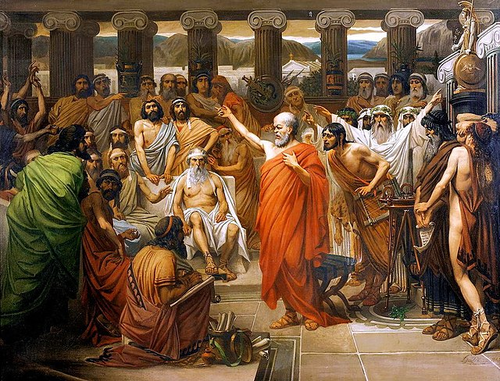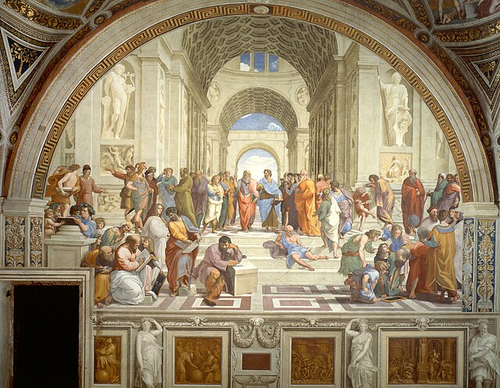Noiser
The Fall of Socrates: Why Athens Condemned Its Greatest Thinker to Death
Play Ancient Civilisations The Golden Age of Athens
In 399 BC, Athens was swept up in one of the most famous legal dramas in history. Much to the horror of his devoted followers, the great philosopher Socrates was put on trial and sentenced to death. But why would such a forward-thinking society execute its greatest mind?

Who was Socrates?
Born in 470 BC, Socrates was the founder of Western philosophy. He was also notoriously annoying. Usually unwashed and wearing a filthy toga, he’d spend his days shuffling around Athens barefoot, striking up long, circuitous conversations with citizens from all walks of life. People would often come out of these chats fundamentally questioning their reality. For example, a military commander might enter a talk with Socrates completely confident that he understood the meaning of “courage” and leave utterly confused.
The only true wisdom is in knowing you know nothing. The unexamined life is not worth living. There is only one good, knowledge, and one evil, ignorance.
Socrates
Socrates would achieve this by relentlessly questioning his subjects’ beliefs and finding contradictions that forced them to confront the limits of their understanding. His methods were divisive, inspiring some while alienating others. Groups of young men flocked to him to debate the nature of love, beauty, and wisdom, and high-ranking citizens invited him to their parties to keep conversation flowing. But others saw him as a nefarious influence who threatened to tear apart the very fabric of Athenian society.
Athens in Crisis

During the period that Socrates was active, Athens was engaged in a bloody war with Sparta that spanned nearly three decades. When Athens eventually lost in 404 BC, a group known as the Thirty Tyrants rose to power. They selected 3,000 Athenians to share governance over the city and murdered their opponents, killing one in twenty of the Athenian population and seizing wealth and property. After a brutal eight months, the tyrants were forced out and democracy was restored. Amnesty was offered to all those who colluded with the tyrants, but with memories still fresh, many still harbored bitterness toward those who supported them.
While Socrates did not actively collude with the tyrants, he didn’t condemn them either. He was notoriously critical of democracy, believing that decisions about policy should not be determined by a majority opinion but by the knowledgeable and wise. This elitist view of governance made Socrates an extremely divisive figure amongst Athenians, who for the most part cherished their city’s democratic ideals.
But it wasn’t Socrates’ controversial stance on democracy that led to his execution (though it certainly didn’t help his case); it was his unique approach to religion. He rejected the traditional portrayal of Greek gods as somewhat flawed figures that had virtues and vices akin to humans, advocating for a more abstract and philosophical approach to divinity that aligned with his ideas of absolute goodness and truth. A great many of his young followers agreed with him, and this is where he really got into trouble. Socrates’ detractors accused him of “corrupting the youth” and incurring the wrath of the gods through his blasphemous teachings.
Philosophy on Trial

In 399 BC, at the age of 70, Socrates was put on trial for “corrupting the youth” and impiety. His fate rested in the hands of a jury of 501 male citizens. During the proceedings, the great philosopher defended himself eloquently, stating that he was merely a teacher and Athens was his classroom. He was not trying to convert Athenian youths to a new ideology because he didn’t have one. He was simply asking questions about the nature of being that he himself did not have the answers to.
But Socrates’ defense fell on deaf ears — he was found guilty on both counts and sentenced to death. Rather than plea for mercy or ask for his sentence to be changed to exile, Socrates was defiant.
Citizens who'd been convicted of horrible crimes, including capital crimes, were normally allowed to put themselves permanently into exile if they wished to escape the penalty, but Socrates was idiosyncratic in the extreme. He never left Athens except when he had to go on citizen militia service. And he kept that [...] truth for himself to the very end, and he accepted his death.
Professor Thomas Martin, author of Ancient Greece from Prehistoric to Hellenistic Times
Socrates remained calm, telling the jury that though his sentence would one day be seen as shameful, he bore them no ill will.
The Execution
 After his conviction, Socrates was brought to the Athenian jail. As soon as they were allowed in, his students pleaded with him to flee the city but, to their dismay, he flatly refused. His execution was scheduled to go forward. Socrates banned all women from attending, including his own wife. When the hour arrived, a prison official brought a vial of hemlock to the convict’s cell. The philosopher’s friends and students watched as he drank the poison. Paralysis spread through his body, starting at his feet, before his heart finally stopped. Socrates, one of the greatest philosophers the world has ever known, was dead.
After his conviction, Socrates was brought to the Athenian jail. As soon as they were allowed in, his students pleaded with him to flee the city but, to their dismay, he flatly refused. His execution was scheduled to go forward. Socrates banned all women from attending, including his own wife. When the hour arrived, a prison official brought a vial of hemlock to the convict’s cell. The philosopher’s friends and students watched as he drank the poison. Paralysis spread through his body, starting at his feet, before his heart finally stopped. Socrates, one of the greatest philosophers the world has ever known, was dead.
The Legacy of Socrates
 Unusually for a philosopher, Socrates never wrote down his ideas. But his philosophy was recorded by his students, most notably by Plato, who immortalised his teacher’s methods in works like “The Apology,” “Phaedo,” and “Crito.” Through these dialogues, Plato ensured that Socratic thought would not die with its creator. In the millennia following his execution, Socrates’ work has gone on to influence countless generations, challenging people to question their innate assumptions and seek knowledge and truth above all else.
Unusually for a philosopher, Socrates never wrote down his ideas. But his philosophy was recorded by his students, most notably by Plato, who immortalised his teacher’s methods in works like “The Apology,” “Phaedo,” and “Crito.” Through these dialogues, Plato ensured that Socratic thought would not die with its creator. In the millennia following his execution, Socrates’ work has gone on to influence countless generations, challenging people to question their innate assumptions and seek knowledge and truth above all else.